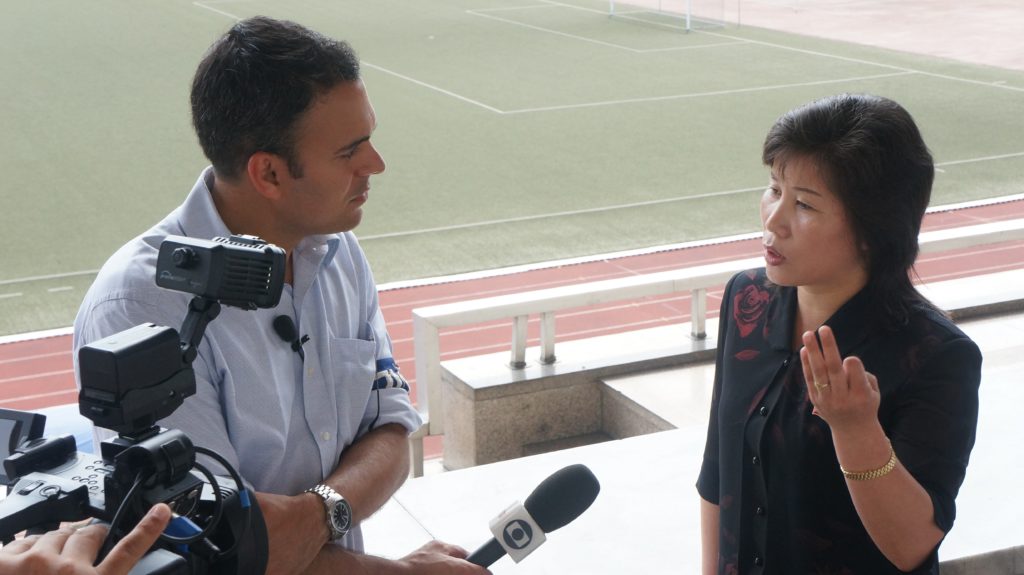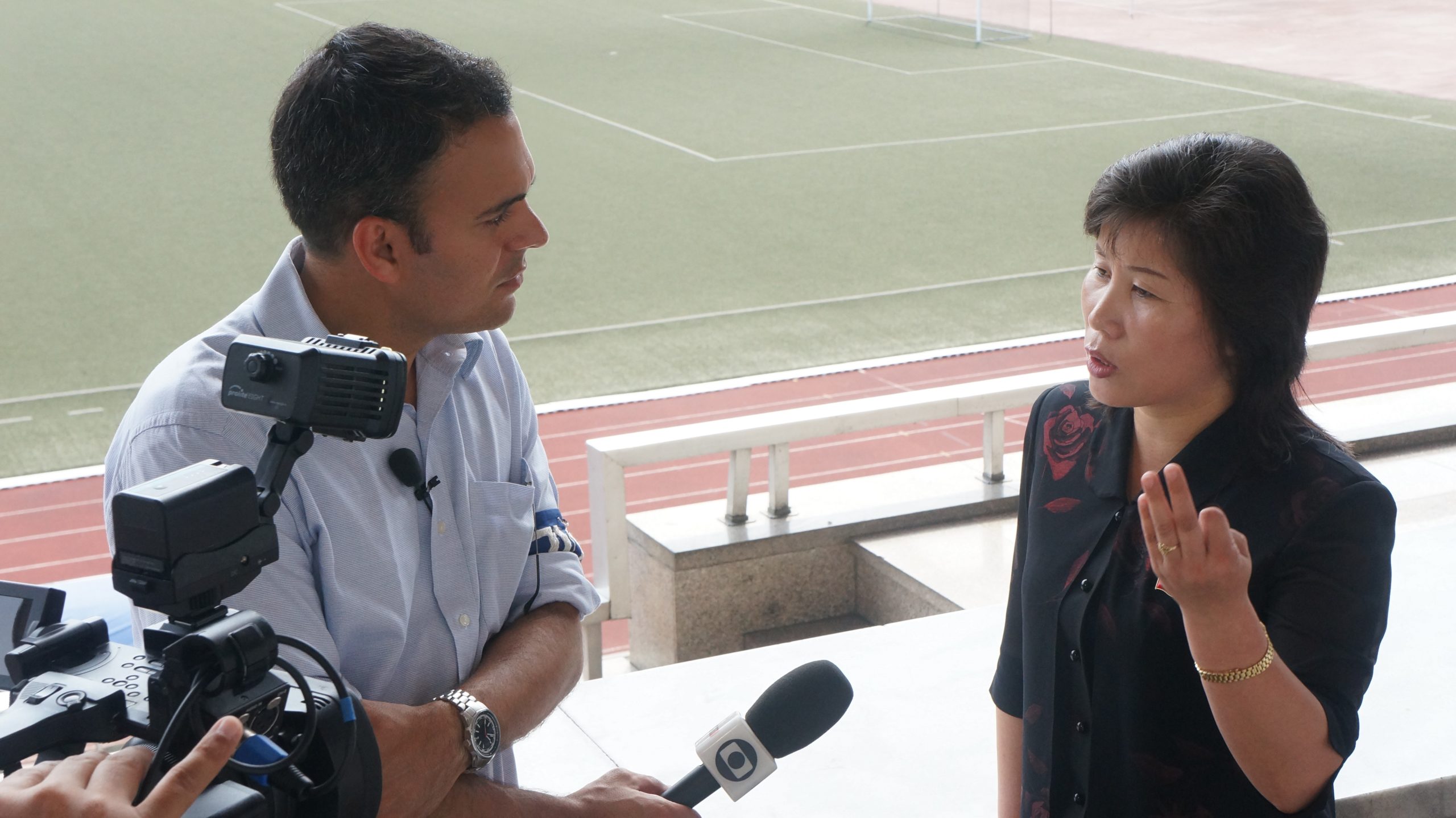The Peninsula
Sports in North Korea
Published August 9, 2016
Category: North Korea

By Caleb Cho
According to a South Korean News Agency, Choe Ryong-hae, vice chairman of North Korea’s Worker’s Party Central Committee, was sent to Brazil along with 31 athletes for the Rio Olympic Games. Given the fact that North Korea has been so isolated from international community for decades and the number of athletes representing North Korea is significantly smaller than that of South Korea, what would be the implication of presence of the state’s second most powerful person in Rio? What does sports mean in daily life of North Korea?
Popularity of Sports
In North Korea, the regime tries to draw the attention of the public to sports, propagating a slogan “Health is a great asset to the country!”. Especially, for most high school boys who are required to join the military after high school, sports is what they care about more than any other subject or their GPA. The most popular sports in North Korea include soccer, Taekwondo, gymnastics, boxing, and track & field. However, more recently basketball, has gained in popularity among the younger generations and is allegedly Kim Jong-un’s favorite sport. Generally speaking, North Koreans are more interested in sports related to national defense than those related to leisure or entertainment.
The regime proactively uses sports to inspire national pride and to release dissatisfaction of the public that originated from the economic downturns since the mid-1990s. The state gives some honors and rewards to players and coaches who get medals in international sports games. For example, gold medalists in World Championships or Olympic Games can receive a luxury car and an apartment with highest honor in sports, and are even praised as national heroes who boost the statue of the state in the world. They are also used in the state’s propaganda to demonstrate the “superiority” of its communism social system and to gain loyalty for the regime.
National hero in North Korea: Jong Song-ok. Photo from Uri Tour’s photostream on flickr Creative Commons.
Jong Song-ok, who won the women’s marathon at the 1999 World Championships, and Kye Sun-hui, who won a gold medal in women’s Judo at an Olympic and four golds in a row at World Championships are among those examples of the state’s use of athletes for propaganda. Television dramas and movies inspired by their stories were made in North Korea.
One of the most interesting facts regarding North Korean sports is that most of athletics who have gained medals in major sporting events are female. Compared to the performance of male athletes, achievements that North Korea’s female athletics have made in some sports areas such as weightlifting, soccer, and judo are somewhat miraculous given the outdated sports infrastructure and technology in North Korea.
Sports in Media
Sports, just like all other sectors in North Korea, are subject to the propaganda of the state where everything is served for the regime and freedom of the press is absent. It may be natural for the state media to selectively broadcast only those recorded games with wins and good performances. And, of course, live broadcasting is awfully rare to avoid national embarrassment. However, there have been exceptional cases of live broadcasts lately in North Korea as the number of athletes who win a prize in international sporting events is getting less and less and often times entering the tournament itself is an inspiration for North Korea. However, there is a downside to live broadcasts. North Korea aired its World Cup soccer match with Portugal live during the 2010 FIFA World Cup, where the state’s football team was defeated 7-0 by Portugal. However, it was the first time North Korea made the World Cup since 1966.
Investment and Sports Marketing
North Korea has a system and the experience to do anything at full gallop for the purpose of showing off national power, so the best players nationwide are often gathered on a single team and receive training together for a long period of time. In case of soccer, the most popular sport in the country, there is a team called the “4.25 sports club” which recruits the nation’s best talented players in their early ages and sends them altogether as a whole team representing the nation for any international games. Even though there are several leagues and teams supported by each government sector, national league games, in general, lack of interest because of a distinct gap in skills between teams.
There is little known about North Korean leaders’ favorite sports, however, the regime seems to provide regular and systemic support in the areas of soccer, taekwondo, track & field, and boxing on an industrial scale. Also, while matches are broadcast in a handful of sports, the reality is that it is too difficult to fully watch a game to the end due to severe power shortages. For the young generations who like sports such as soccer or basketball, the best way is to watch video clips saved in CDs or memory sticks, which are often illegally bought and circulated through the black market by individuals who have visited or stayed foreign countries. That might be how the world’s sports superstars such as Michael Jordan, Cristiano Ronaldo and Lionel Messi are also known to North Korean nationals.
In conclusion, North Korea puts its emphasis on several defense related sports and its investment is concentrated in a handful of areas according to the state’s purpose and interest. Sports is used as a tool of the regime’s propaganda to enhance its status in the world and to distract public discontent rising from economic failure. The access to modern sports information and technology is made mainly through a limited number of professional players and sports manias; on the other hand, it may take a long to realize the popularization of sports in North Korea due to the lack of necessary infrastructure in the state.
Caleb Cho is an intern with the Korea Economic Institute of America and a masters candidate in Economics at Tufts University. The views expressed here are the author’s alone.
Photo from Andrea Williams photostream on flickr Creative Commons.

